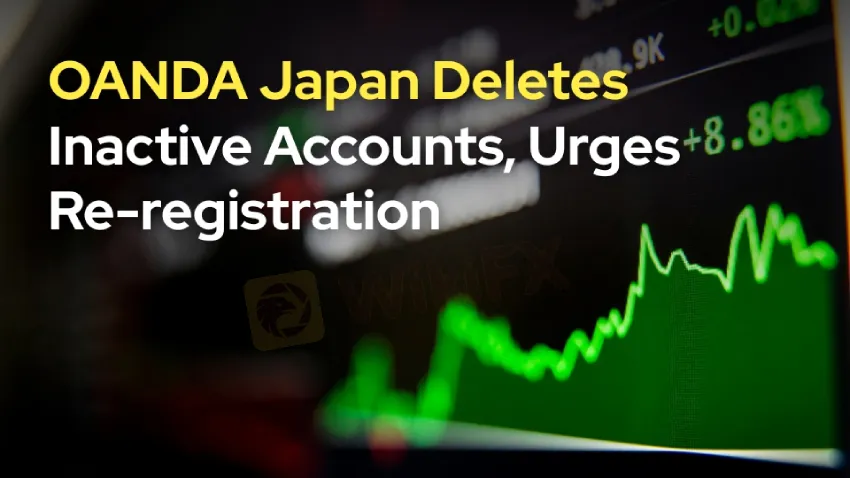简体中文
繁體中文
English
Pусский
日本語
ภาษาไทย
Tiếng Việt
Bahasa Indonesia
Español
हिन्दी
Filippiiniläinen
Français
Deutsch
Português
Türkçe
한국어
العربية
OANDA Japan Deletes Inactive Accounts, Urges Re-registration
Abstract:OANDA Japan terminates dormant accounts with no balance after two years, requiring re-registration. Learn about the policy and OANDA’s recent expansions.

OANDA Japan, a subsidiary of the global brokerage OANDA Corporation, has permanently deleted accounts inactive for over two years with zero balance, the company announced on Monday. This action, aligned with its terms for trading over-the-counter (OTC) derivatives, aims to maintain operational efficiency and ensure compliance with regulatory standards. The policy, though long-standing, may catch some traders off guard if they leave accounts idle without formally closing them.
On May 20, the company sent emails to affected users, informing them that their unused accounts were closed and cannot be brought back. The online trading platform made it clear that this decision is final, and deleted accounts are gone for good.
Traders who want to start trading with OANDA Japan again after their account is deleted will need to sign up from scratch. This includes submitting new identity documents to meet regulatory standards. The company stressed that these steps are crucial to comply with local financial laws.

This practice of clearing out inactive accounts isnt unique to OANDA Japan. Many brokerage firms regularly remove unused accounts, especially those with no money or recent activity. This helps keep operations smooth, protects user information, and cuts down on extra costs.
Some traders who left their accounts without officially closing them might be surprised by this move, even though it‘s been part of OANDA Japan’s rules for a while. The company urges users to stay updated and manage their accounts actively to avoid unexpected issues.
These changes come after OANDA Global Corporation, OANDA Japan‘s parent company, was bought by FTMO Group in February this year. The acquisition has led to new services, like the launch of OANDA Labs Trader, which signals the company’s move into proprietary trading.
OANDA has also expanded its offerings by adding Exchange-Traded Funds (ETFs) to its European investment options. These steps show OANDAs focus on growing its services while keeping its strong commitment to following regulations and supporting customers.
In conclusion, OANDA Japan‘s removal of inactive accounts highlights the need to keep trading accounts active and compliant. For users whose accounts were deleted, the only option is to re-register fully. This move matches industry norms and helps ensure trading platforms remain secure and efficient in today’s fast-changing financial world.
You can check out more of Oanda's latest news here: https://www.wikifx.com/en/dealer/0001134561.html

Disclaimer:
The views in this article only represent the author's personal views, and do not constitute investment advice on this platform. This platform does not guarantee the accuracy, completeness and timeliness of the information in the article, and will not be liable for any loss caused by the use of or reliance on the information in the article.
Read more

PaxForex Review 2025: Is It Safe or a Scam?
PaxForex Review 2025: Discover if PaxForex is a safe broker or a high-risk option. Get insights on regulation, trading instruments, fees, and leverage.

5 Cons of DB Investing Broker You Must Know
It's always advisable to read online review articles about forex brokers you are thinking to Invest your money with. The forex market has become increasingly unsafe due to the rise of fraudulent brokers. Review articles help you spot scam brokers and protect your money. Read this important article about DB Investing to stay fraud alert.

iForex - Where Withdrawal Denials, High Spread & Scams Spoil Your Forex Trading Mood
Are high spreads charged by iForex disallowing you to make profits? Do you feel that you will never be able to withdraw from iForex? It's nothing new! Read this exposure story where we have highlighted complaints from several investors.

Scam Alert: Cloned Broker Scams on the Rise
Reputed authorities like the FCA have issued warnings against brokers who act genuine but are actually fake brokers. They copy details such as logos, names, branding, and sometimes even employee appearances to trick investors and steal money from them.
WikiFX Broker
Latest News
Forex Hedging Strategies - Calming You Amid Market Chaos
LSEG Announces £1 Billion Share Buyback Program
Ultima Markets enters the UK and gains the FCA license
SEC Lawsuit Targets Real Estate Fraud Scheme by Joseph Nantomah
A Beginner’s Guide to Trading Forex During News Releases
What Is Forex Currency Trading? Explained Simply
Key Events This Week: ISM, Trade Balance And More Earnings
ASIC Regulated Forex Brokers: Why Licensing Still Matters in 2025
Interactive Brokers: A Closer Look at Its Licenses
TradersWay Broker Review 2025: Unregulated Status and Global Warnings You Shouldn’t Ignore
Currency Calculator


